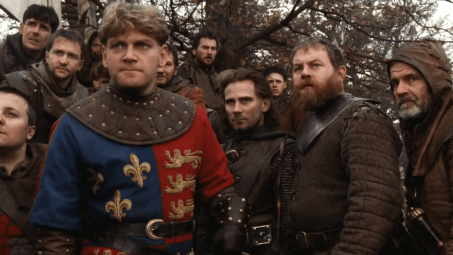St. Crispin’s Day: ‘If We Are Mark’d to Die, We Are Enough to Do Our Country Loss’
Posted on | October 25, 2022 | 1 Comment

Great victories in warfare require great risk. Even if a commander has the numerical odds in his favor, the fortunes of war are always uncertain, and there is therefore danger in undertaking any offensive operation. Certainly, history affords many examples of battles where the attacking force had every advantage, and yet the troops in the vanguard suffered shocking casualties, as in Operation Overlord, where the Americans had to fight like hell to gain a foothold at Omaha Beach, to say nothing of the paratroopers killed in the airborne operations that preceded the D-Day landings. A wise commander must be reasonably cautious, but he cannot be too risk-averse, or else he would never take the calculated gambles necessary to obtain victory. Indeed, in the example of D-Day, Dwight Eisenhower had to roll the dice to order the landings under less-than-ideal weather conditions, or else postpone the invasion.
Speaking of military expeditions to northern France, Henry V’s adventures in 1415 demonstrated a courage that rings through the ages. It was on this day — October 25, St. Crispin’s Day — that Henry’s English army, outnumbered 2-to-1 by the French, achieved their memorable victory at Agincourt. The king’s famous pre-battle soliloquy by Shakespeare deserves a repetition on this occasion:
WESTMORLAND. O that we now had here
But one ten thousand of those men in England
That do no work to-day!
KING. What’s he that wishes so?
My cousin, Westmorland? No, my fair cousin;
If we are mark’d to die, we are enough
To do our country loss; and if to live,
The fewer men, the greater share of honour.
God’s will! I pray thee, wish not one man more.
By Jove, I am not covetous for gold,
Nor care I who doth feed upon my cost;
It yearns me not if men my garments wear;
Such outward things dwell not in my desires.
But if it be a sin to covet honour,
I am the most offending soul alive.
No, faith, my coz, wish not a man from England.
God’s peace! I would not lose so great an honour
As one man more methinks would share from me
For the best hope I have. O, do not wish one more!
Rather proclaim it, Westmorland, through my host,
That he which hath no stomach to this fight,
Let him depart; his passport shall be made,
And crowns for convoy put into his purse;
We would not die in that man’s company
That fears his fellowship to die with us.
This day is call’d the feast of Crispian.
He that outlives this day, and comes safe home,
Will stand a tip-toe when this day is nam’d,
And rouse him at the name of Crispian.
He that shall live this day, and see old age,
Will yearly on the vigil feast his neighbours,
And say “To-morrow is Saint Crispian.”
Then will he strip his sleeve and show his scars,
And say “These wounds I had on Crispin’s day.”
Old men forget; yet all shall be forgot,
But he’ll remember, with advantages,
What feats he did that day. Then shall our names,
Familiar in his mouth as household words—
Harry the King, Bedford and Exeter,
Warwick and Talbot, Salisbury and Gloucester—
Be in their flowing cups freshly rememb’red.
This story shall the good man teach his son;
And Crispin Crispian shall ne’er go by,
From this day to the ending of the world,
But we in it shall be rememberèd—
We few, we happy few, we band of brothers;
For he to-day that sheds his blood with me
Shall be my brother; be he ne’er so vile,
This day shall gentle his condition;
And gentlemen in England now a-bed
Shall think themselves accurs’d they were not here,
And hold their manhoods cheap whiles any speaks
That fought with us upon Saint Crispin’s day.
“The fewer men, the greater share of honour” — that’s the spirit! The English yeomanry did themselves proud on that St. Crispin’s Day:
The French had suffered a catastrophic defeat. In all, around 6,000 of their fighting men lay dead on the ground. The list of casualties, one historian has noted, “read like a roll call of the military and political leaders of the past generation”. Among them were 90–120 great lords and bannerets killed, including three dukes (Alençon, Bar and Brabant), nine counts (Blâmont, Dreux, Fauquembergue, Grandpré, Marle, Nevers, Roucy, Vaucourt, Vaudémont) and one viscount (Puisaye), also an archbishop. . . . According to the heralds, 3,069 knights and squires were killed, while at least 2,600 more corpses were found without coats of arms to identify them. Entire noble families were wiped out in the male line, and in some regions an entire generation of landed nobility was annihilated.
The number of French killed was equal to the entire size of Henry’s army! The French never really recovered the prestige they lost at Agincourt, and why this great defeat? Because Henry was willing to take the risk of fighting against the odds. Therefore truly, Oct. 25 “shall ne’er go by . . . to the ending of the world,” that we do not stop to recall the courageous feats of King Henry V and his “band of brothers.”
Comments
One Response to “St. Crispin’s Day: ‘If We Are Mark’d to Die, We Are Enough to Do Our Country Loss’”
October 26th, 2022 @ 1:25 pm
[…] The Other McCain wrote about this yesterday, and I intended to link it but….any way, enjoy. […]